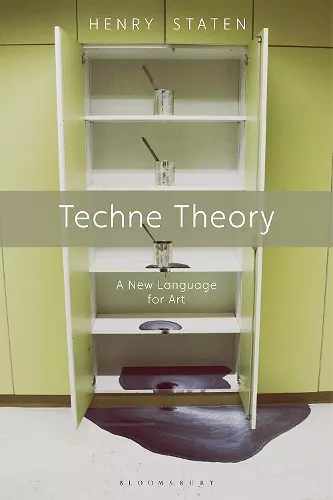Techne Theory
A New Language for Art
Format:Paperback
Publisher:Bloomsbury Publishing PLC
Published:21st Feb '19
Currently unavailable, and unfortunately no date known when it will be back

Original contribution to contemporary aesthetics that draws on a combination of traditional philosophical ideas and contemporary materialist and theoretical approaches.
Only since the Romantic period has art been understood in terms of an ineffable aesthetic quality of things like poems, paintings, and sculptures, and the art-maker as endowed with an inexplicable power of creation. From the Greeks to the 18th century, art was conceived as techne--the skill and know-how by which things and states of affairs are ordered. Techne Theory shows how to use this concept to cut through the Romantic notion of art as a kind of magic by returning to the original sense of art as techne, the standpoint of the person who actually knows how to make a work of art.
Understood as techne, art-making, like all other cultural accomplishments, is a form of work performed by an artisan who has inherited the know-how of previous generations of artisans. Along the way, Techne Theory cuts through the humanist-structuralist impasse over the question of artistic agency and explains what 'form' really means.
Each of the diverse chapters makes for highly interesting (and for an analytic philosopher refreshingly different) reading … [For] analytic philosophers of aesthetics, who have for the most part neglected the topic of creativity, this book is interesting and creative in both style and content. * Notre Dame Philosophical Reviews *
From the standpoint of techne theory, Kant’s most radical insight concerned the limitation of the creative power of individual genius, which cannot account for the emergence of the novelty or the formal evolution of the artwork. Building on this critical insight, Staten creates a highly original phenomenological investigation into the technical components of “art-making,” remaining grounded in material processes and what art and literary theory can (and cannot) tell us about them. -- Gregg Lambert, Dean's Professor and Director of the Syracuse University Humanities Center, USA
In this learned, original, important, and always lively new study, Henry Staten moves today’s heated and often sterile debate about aesthetic form to a new place—a place that is also (and in the best sense), an old place, newly inhabited. Staten rethinks Plato’s and Aristotle’s concepts of eidos and techne in three ways: first, by bringing searching attention of a scholarly and critical kind to tensions and contradictions within the founding works themselves; second, by making those works respond to the very developments that they sponsored in both Romantic and modernist works; and third, by coordinating ancient Greek concepts of art, form, medium, making, and doing, with a posthumanist framework that reunites knowledge and know-how, theory and practice, eidos and hyle, and vates and poietes. Anyone with any interest in the idea of form (and in the formation of ideas) should read this book. It changes the game we’ve been playing. -- Marjorie Levinson, F.L. Huetwell Professor of English, University of Michigan, USA * 15/01/2019 *
ISBN: 9781472592903
Dimensions: unknown
Weight: 338g
216 pages